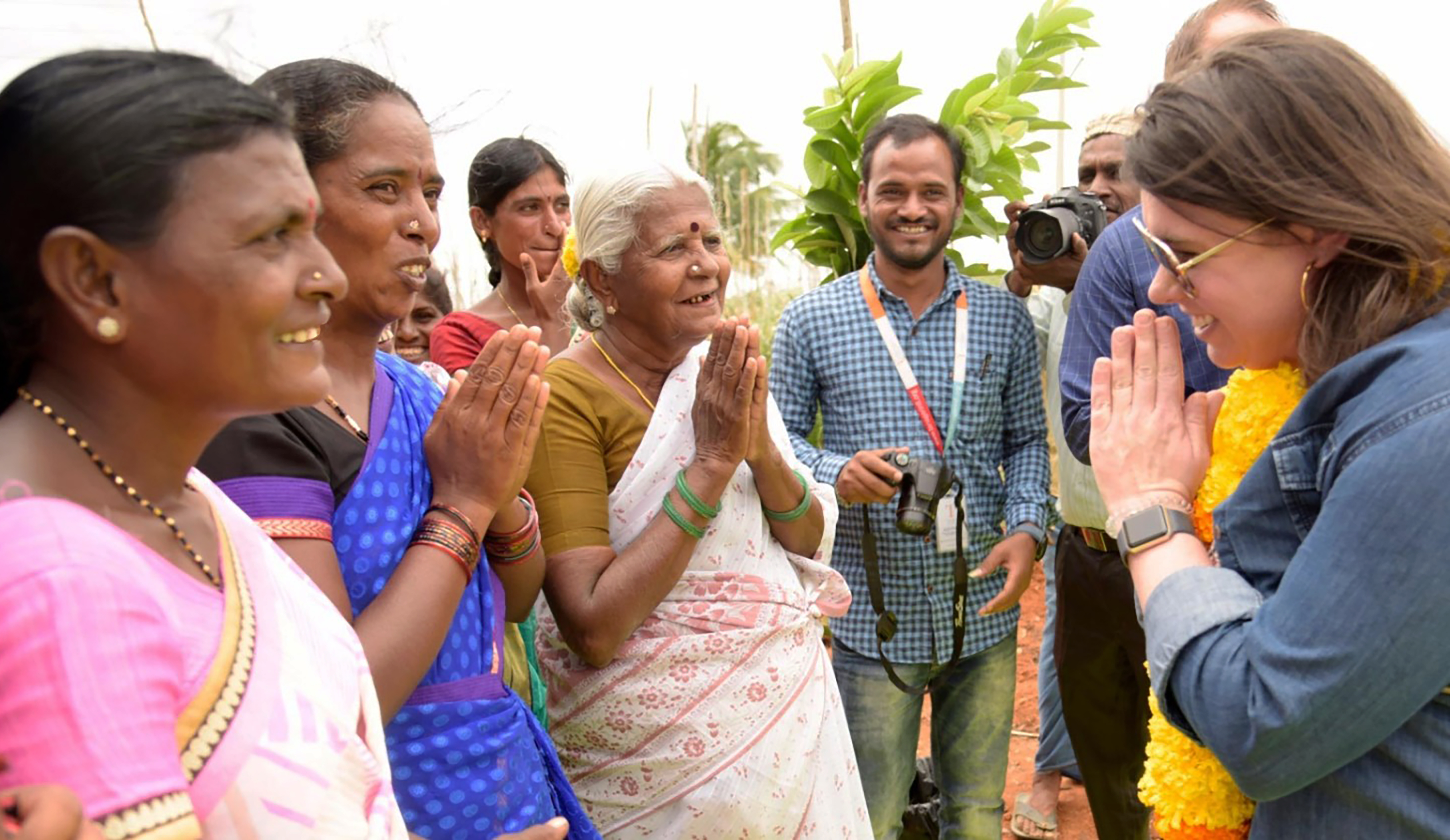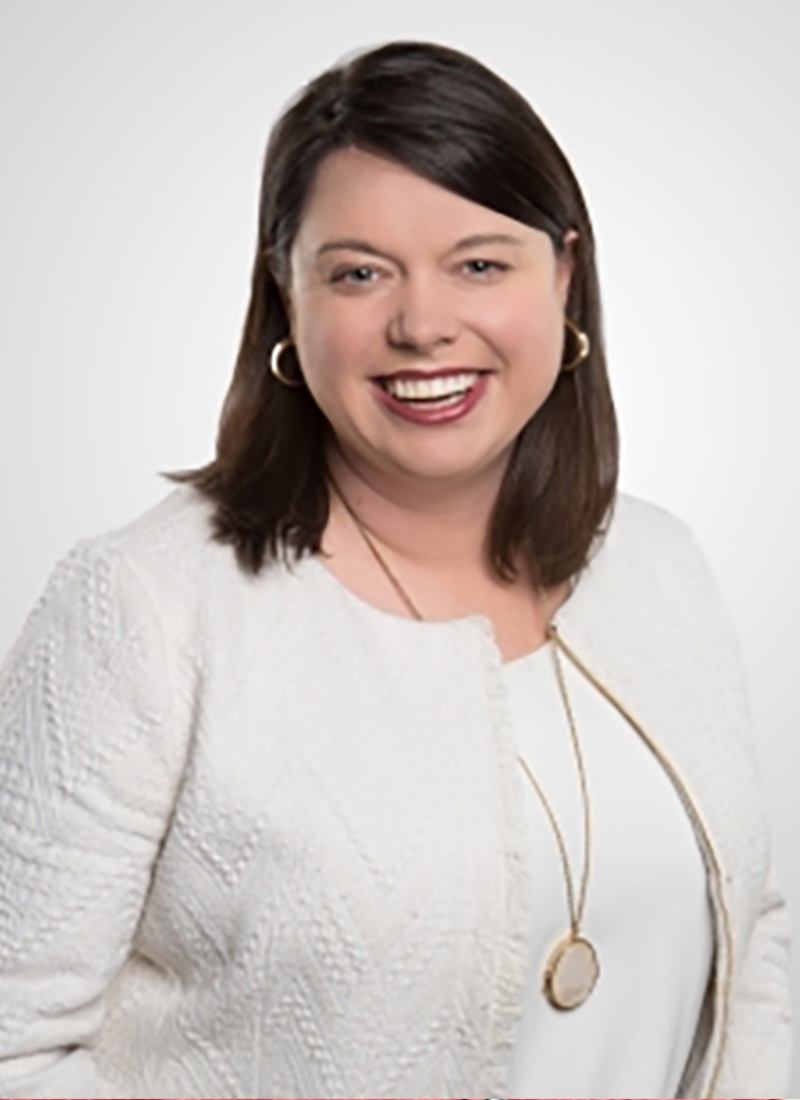
Look around any city, and you’re likely to find Rhodes College graduates doing work to better their local communities. Through the Walmart Foundation, Julie Gehrki ’02 is bringing a holistic approach to global community service.
By Samuel X. Cicci ‘15
Many students make their way through college with minds devoted to service, but for some, that calling beckons on a grander stage. For Julie Gehrki ‘02, the idea of giving back to her community had always been a part of who she was, and today, that devotion to service has led to her current role as vice president of philanthropy at Walmart and the Walmart Foundation, where she uses her skills to target humanitarian causes on a global scale.
For the Arkadelphia, AR, native, pursuing a career in philanthropy was a no-brainer. “The concept of ‘service to others,’ has always been in my family’s DNA,” says Gehrki. “My parents, who are both Rhodes graduates, really instilled that in me. My dad is a physician who cares deeply about his patients and their health. My mom was a professor who now runs a yarn shop in South Arkansas, because she wanted to create a place for people to connect and get to know each other.”
With service at the front of her mind and a passion for community work, Rhodes was an easy choice for Gehrki. As soon as she set foot on campus, she began familiarizing herself with Memphis, identifying areas where she could make an impact, and drawing up plans to allow herself and other students to do just that.
As a religious studies major, Gehrki worked closely with professors whose work focused on the teachings of Martin Luther King Jr., social justice, and the intersection of theology with philanthropy. “Professor Michael McMahon taught a theology class focused on poverty, which made a big impact on me,” recalls Gehrki. “And Jim Lanier’s History of Philanthropy course really dug into the good and bad of philanthropy, and its role in American society. But what I found tremendously powerful about Rhodes is the humanity of the professors, who are willing to grapple with these tough issues and ask really hard questions about our community. And then take that and see how you can be a good citizen outside Rhodes.”

The curriculum and the words of her professors encouraged Gehrki to experience Memphis outside the classroom. Active in the Laurence F. Kinney community service program, Gehrki worked in North Memphis, where she was involved in an after-school program, interned with the Metropolitan Inter-Faith Association (MIFA), and was involved in the student-run soup kitchen. “Rhodes really encouraged us to be active in the community,” says Gehrki, “so I frequently found myself at the student-run soup kitchen or Holy Community Church. Community members like Reverend Moor and frequent soup kitchen visitors like Abe played essential roles in my educational experience, grounding me in the reality of community issues that were often more theoretical on campus.”
Gehrki’s community work at Rhodes culminated in the Algernon Sydney Sullivan Student Award at Rhodes and recognition as one of six Jane Addams - Andrew Carnegie Fellows by the University of Indiana Center for Philanthropy. But her work at Rhodes set the stage for her eventual role at Walmart, where she applies her micro-level community analysis to issues around the world.
Last year, the Walmart Foundation gave more than $1.7 billion in cash and in-kind donations to causes worldwide. The foundation’s work is centered around four pillars: increasing economic mobility, enhancing sustainable supply chains, strengthening community resilience, and advancing racial equality. Gehrki’s mission is to combine the business strengths of Walmart with philanthropic investments to change systems for better outcomes for people and the planet. “It’s not just about writing a check,” says Gehrki. “At Walmart, we try to be systems thinkers when it comes to problem solving, which means you really can't isolate one part of an issue without recognizing how the big picture fits together. And so it was really helpful for me to have the analytical frameworks and critical thinking that I learned in the classroom, along with the global exposure and the tough questions from professors to grapple with.”
Take, for example, the Walmart Foundation’s approach to sustainability and economic mobility abroad. The company has a large stake in Flipkart, a huge e-commerce platform in India, and Gehrki’s approach looks at how they can support the smallholder farmers and farmer producer organizations who produce food and other agricultural goods in the country. “We travel to rural India and work closely with these farms, as it’s important to be in the community and understand the issues they face. We’re helping them increase sustainable production capacity so that they’re in a place to sell to formal markets, which increases their livelihood.” The company’s five-year strategy aims to reach 1 million smallholder farmers by 2028, with at least 50 percent of those being women. So far, the company has given out grants totaling $39 million to nonprofits operating in Uttar Pradesh, Karnataka, West Bengal, Maharashtra, Andhra Pradesh, and Odisha.
Walmart is also developing economic mobility initiatives right here at home. The company has implemented a program where employees without college degrees have a pathway towards education, and a way to learn skills that can further their careers. “Walmart can do a lot through the business by providing a huge amount of training to our frontline associates,” says Gehrki. “We've restructured jobs so that they work in teams with a coach. And we have 200 academies around the country where they go to get learning that can be good for up to 21 college credits. We offer free education—four-year and two-year college, and short-term credentials—to frontline associates. There's a lot we can do through the business for our own workforce, which is 1.6 million people in the United States.
“Then, we complement the company’s efforts with philanthropic investments that help society transition to a skills-based economy, where skills gained on the job, in the classroom, or through voluntary service all count. The question we aim to solve is, ‘How do we build that world where all learning counts and it builds on each other, and people can have really dynamic career trajectories whether formal education was right for them or not?’”
Looking ahead, much of Gehrki’s focus is aimed at environmental issues and biodiversity. Walmart and the Walmart Foundation, she says, have made a commitment to preserve, protect, and sustainably manage 50 million acres of land and one million square miles of ocean by 2030. “Philanthropy is important, but not enough on its own to change a system, so we look at things that complement and extend the impact of the business, like how we source seafood that’s more sustainable for the ocean. And work like that needs to be focused in specific places.” A notable example is Walmart’s relationship with the Marshall Islands, a chain in the Pacific Ocean that runs between Hawaii and the Philippines.
“That’s where a ton of seafood and tuna is harvested and caught,” says Gehrki. “And that is a partnership that the people of the Marshall Islands helped shape and define. They own the business now, along with an NGO. It is meant to really increase the economic viability of the Islands, but also catch tuna with sustainable practices for both the people on the boats and the health and biodiversity of the ocean.”
As Gehrki and Walmart continue to support new causes, the focus remains on philanthropic systems that benefit local communities, individuals, and the environment. Even if that means shaking up logistics. “That’s really the ethos of our work,” continues Gehrki. “How do we rewire supply chains so that the indigenous people in an area benefit, how do we reduce emissions and retain biodiversity? There's really inspiring work going on in that space to think beyond the single farm or the single boat, to how we work with governments and others to redesign a broader region and say this region is going to produce and harvest and grow in ways that are good for people on the planet.”